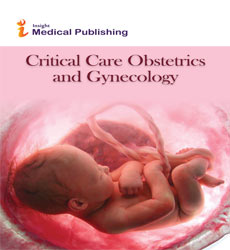Critical Discourse in Women's Health: Obstetric and Gynaecologic Care in Focus
Sergey Gavrilov
Department of Social and Behavioural Sciences, University of Harvard Boston, USA
Published Date: 2023-08-20DOI10.36648/2471-9803.9.3.130
Sergey Gavrilov*
Department of Social and Behavioural Sciences, University of Harvard Boston, California, USA
- *Corresponding Author:
- Sergey Gavrilov
Department of Social and Behavioural Sciences,
University of Harvard Boston, California,
USA,
E-mail: sergey@gmail.com
Received date: July 21, 2023, Manuscript No. IPCCO-23-17823; Editor assigned date: July 24, 2023, PreQC No. IPCCO-23-17823 (PQ ); Reviewed date: August 07, 2023, QC No. IPCCO-23-17823; Revised date: August 14, 2023, Manuscript No. IPCCO-23-17823( R); Published date: August 21, 2023, DOI: 10.36648/2471-9803.9.4.130
Citation: Gavrilov S (2023) Critical Discourse in Women's Health: Obstetric and Gynaecologic Care in Focus. Crit Care Obst Gyne Vol.9.No.4:130.
Description
Critical discourse in women's health regarding obstetric and gynecologic care revolves around examining the social, cultural, economic, and political factors that influence the experiences and outcomes of individuals seeking and providing care in these domains. This discourse critically evaluates various aspects of women's health, including healthcare access, medical practices, reproductive rights, and gender disparities. Let's delve into some key areas of critical discourse in obstetric and gynecologic care cal discourse in women's health emphasizes the importance of reproductive rights and bodily autonomy. It questions how societal norms, laws, and policies impact a person's ability to make decisions about their reproductive health, including access to contraception, abortion services, and fertility treatments. Medicalization of This aspect examines how women's bodies have been historically medicalized, often leading to overmedicalization and unnecessary interventions. For instance, the discourse questions the prevalence of unnecessary cesarean sections and the use of medical interventions during childbirth. Critical discourse highlights the need for informed consent and shared decision-making between healthcare providers and patients. It questions whether patients are adequately informed about the risks and benefits of medical procedures and whether their preferences are truly considered in the decision-making process. Discussions around healthcare disparities focus on the unequal access to quality care based on factors such as race, ethnicity, socioeconomic status, and geography. Critical discourse scrutinizes how these disparities affect the health outcomes of marginalized groups, particularly women of color.
Medical Research and Innovation
The high rates of maternal mortality and morbidity in certain populations have prompted critical discussions about systemic failures in healthcare systems. These conversations address factors such as lack of appropriate prenatal care, racial biases in medical treatment, and inadequate postpartum care. Critical discourse emphasizes the importance of considering intersectionality—the interconnected nature of social identities —in women's health. It acknowledges that experiences and outcomes are shaped by a combination of factors, such as gender, race, socioeconomic status, and sexual orientation. Discussions surrounding cultural sensitivity and competence in obstetric and gynecologic care recognize the diverse cultural backgrounds of patients. They explore how healthcare providers can provide respectful and effective care that considers cultural beliefs and practices. Body Positivity and Critical discourse challenges unrealistic beauty standards and societal pressures related to women's bodies. It addresses the impact of these standards on body image, mental health, and decisions about reproductive health. This aspect evaluates barriers to accessing obstetric and gynecologic care, including geographic location, insurance status, and financial limitations. Critical discourse seeks to understand how these barriers contribute to health disparities. Discussions about medical ethics in women's health involve evaluating the ethical implications of medical research, clinical trials, and experimental procedures. It questions whether women have been historically underrepresented in research and whether their rights and safety have been upheld. Critical discourse in women's health encourages ongoing conversations about these topics to drive positive changes in healthcare policies, practices, and attitudes.
Gender Bias and Stereotypes
It seeks to empower individuals to take control of their reproductive health while advocating for a more equitable and patient-centered approach to obstetric and gynecologic care. Critical discourse in women's health, particularly within the realm of obstetric and gynecologic care, is a multifaceted topic that encompasses a wide range of issues related to gender, healthcare, and societal norms. This critical discourse examines the ways in which women's health is understood, discussed, and delivered, with a focus on identifying and challenging disparities, biases, and structural inequalities. Here are some key areas of focus within this discourse. Access to quality obstetric and gynecologic care is a fundamental aspect of women's health. Critical discourse highlights the disparities in access based on factors such as socioeconomic status, race, ethnicity, geography, and immigration status. It also critiques the impact of healthcare policies, insurance coverage, and provider availability on women's ability to receive timely and appropriate care. Discussions in this area often revolve around reproductive rights, including access to contraception, abortion, and fertility treatments. Critical discourse aims to challenge political, legal, and social barriers that can limit women's autonomy over their reproductive choices. This aspect of the discourse explores how women's health issues, particularly those related to reproduction, have been historically medicalized. It questions whether certain medical interventions and procedures are overused, unnecessary, or potentially harmful. This includes debates around the increasing rates of cesarean sections, the use of medical interventions in childbirth, and the marketing of pharmaceuticals for women's health.
In conclusion, critical discourse in women's health within the field of obstetric and gynecologic care seeks to challenge existing norms, biases, and inequalities while advocating for a more inclusive, patient-centered, and holistic approach to women's healthcare. It aims to promote gender equity in healthcare access and outcomes and empower women to have greater control over their health and well-being. Discussions often emphasize the importance of health education and literacy to empower women to make informed decisions about their health and to navigate the healthcare system effectively.
Open Access Journals
- Aquaculture & Veterinary Science
- Chemistry & Chemical Sciences
- Clinical Sciences
- Engineering
- General Science
- Genetics & Molecular Biology
- Health Care & Nursing
- Immunology & Microbiology
- Materials Science
- Mathematics & Physics
- Medical Sciences
- Neurology & Psychiatry
- Oncology & Cancer Science
- Pharmaceutical Sciences
